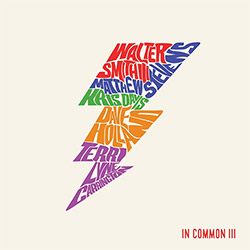
The third in tenor saxophonist Walter Smith III and guitarist Matthew Stevens' rotating quintet configuration of their "In Common" project, here with Kris Davis on piano, Dave Holland on bass and Terri Lyne Carrington on drums, performing "one-page songs" written for the musicians involved, lyrical jazz reflecting on the tradition through modern creative freedom.
Out of Stock
Quantity in Basket: None
Log In to use our Wish List
Shipping Weight: 3.00 units
Sample The Album:
Walter Smith III-tenor saxophone
Matthew Stevens-guitar
Kris Davis-piano
Dave Holland-bass
Terri Lyne Carrington-drums
Click an artist name above to see in-stock items for that artist.
UPC: 655498298035
Label: Whirlwind
Catalog ID: CD-WWR-4783
Squidco Product Code: 31508
Format: CD
Condition: New
Released: 2022
Country: USA
Packaging: Cardboard Gatefold
Recorded at Clubhouse, in June, 2021.
"Walter Smith III and Matthew Stevens are two musicians at the forefront of developments in jazz and improvised music, listing the likes of Terence Blanchard, Ambrose Akinmusire, Esperanza Spalding and Christian Scott as collaborators. The pair started working together in 2017, and four years later, they're back for the third iteration of their highly commended In Common project. Previous guests include Nate Smith, Linda May Han Oh and Marcus Gilmore; on In Common 3, Kris Davis takes the piano chair vacated by Micah Thomas, and completing the lineup are two legends of the game - Dave Holland and Terri Lyne Carrington.
, ,What's new, third time around? "It's longer, freer, and yet more spontaneous," says Smith. The successful In Common formula - inventive 'one-page songs' written with specific musicians in mind - disguises the through-line that uniquely shapes this record: "The spotlight is on the community of musicians as a whole," Smith comments. "The general vibe is sculpted by the musicians' interpretations of what we bring in." Davis' influential presence means the project leans into the aesthetics of free improvisation for the first time; the resulting soundworld lends itself to electronic manipulation, another first for the series.
, ,The span of fifteen tracks showcases the duo's knack for reinvention, slipping into unfamiliar contexts without losing sight of the album's focused essence. Smith is keen to emphasise the standalone nature of the divergent In Common recordings. Some aspects carry through though, like their commitment to remembering lost influences - opener 'Shine' serves as both a thank you and an acknowledgement to McCoy Tyner, Wallace Roney, Chick Corea, Jimmy Health and Ellis Marsalis. That introduces the remaining fourteen tracks, that divide nearly exactly into spontaneously constructed ideas that introduce fully composed tracks. "-Whirlwind
,Artist Biographies
• Show Bio for Walter Smith III "Walter Smith III: "From an early age, Walter began taking music very seriously. "My first gig was playing at a McDonalds in Houston with another saxophone player. I took a solo on "Blue Bossa." It was terrible. People clapped, and I figured if I could get away with that and get applause, how could I fail?" Although it may appear Smith is a new voice on the scene, he is widely recognized as an adept performer, accomplished composer, and inspired educator. This spring, Smith welcomes his newest release, In Common III. The boundary pushing album features some of the most important and talked about musicians in the world - Matt Stevens, Kris Davis, Dave Holland and Terri Lyne Carrington. Smith has developed under the wings of many of the music's greats. Walter is/has been a member of several legendary groups (recording and/or touring) including the Roy Haynes Fountain of Youth Band, Terence Blanchard Quintet, Eric Harland's "Voyager", Bill Stewart Trio, Jason Moran's In My Mind:Monk at Town Hall, Ambrose Akinmusire Quintet, the Christian McBride "Situation", Marquis Hill "New Gospel Revisited", Gerald Clayton Quintet, Christian Scott group and the Sean Jones Quintet to name a few. Smith has performed all over the world participating in virtually every international festival as well as famed venues such as Carnegie Hall, the Village Vanguard, and the Kennedy Center. In addition, he has shared the stage and/or appeared on recordings with many important artists including Mulgrew Miller, Billy Childs, Joe Lovano, Herbie Hancock, Maria Schneider, Dee Dee Bridgewater, Terri Lyne Carrington, Ralph Peterson, and a host of others. To date, Walter has appeared on over 100 recordings that are released worldwide. Originally from Houston, TX, Smith now resides in Boston, MA and is Chair of Woodwinds at Berklee College of Music helping to prepare the next generation of young artists." ^ Hide Bio for Walter Smith III • Show Bio for Matthew Stevens "A leading artist of his generation, Grammy Nominated "Matthew Stevens' singular style dissolves the demarcation lines between jazz, rock and ambient music." (Mojo****) Stevens' music is "honest and soulful" (Pitchfork) and is described as "music (that) advances the ideals of modern jazz". (NPR) In addition to his critically acclaimed solo albums, Woodwork, Preverbal, Pittsburgh and In Common 1, 2 and 3 with Walter Smith III, Stevens' songs and guitar playing are featured on over 70 albums including those by artists Christian Scott atunde Adjuah, Esperanza Spalding, Terri Lyne Carrington, Dave Douglas, Anna B Savage, Jamire Williams, Sean Jones, Linda May Han Oh, Harvey Mason, and Jany Green. Stevens has worked as a guitarist with producers Quincy Jones, Glen Ballard and Tony Visconti. As a producer, he worked on Esperanza Spalding's albums Exposure and the Grammy winning 12 Little Spells and on Terri Lyne Carrington's Grammy nominated album Waiting Game, which featured guests such as Lalah Hathaway, Andrew Bird, Robert Glasper, Rapsody, Maimouna Youssef, Meshell Ndegeocello, Malcolm Jamal Warner, and Kokayi. He lives in Harlem NY and is a Professor of Jazz Studies at the Peabody Conservatory in Baltimore, MD." ^ Hide Bio for Matthew Stevens • Show Bio for Kris Davis "Pianist-composer Kris Davis has blossomed as one of the singular talents on the New York jazz scene, a deeply thoughtful, resolutely individual artist who offers "uncommon creative adventure," according to JazzTimes. The Vancouver-born, Brooklyn-residing Davis was dubbed one of the music's top up-and-comers in a 2012 New York Times article titled "New Pilots at the Keyboard," with the newspaper saying: "Over the past couple years in New York, one method for deciding where to hear jazz on a given night has been to track down the pianist Kris Davis." Reviewing one of the series of striking albums Davis has released over the past half-decade, the Chicago Sun-Times lauded the "sense of kaleidoscopic possibilities" in her playing and compositions. Long favored by her peers and jazz fans in the know, Davis has earned high praise from no less than star pianist and MacArthur "Genius" Grant honoree Jason Moran, who included her in his Best of 2012 piece in Art Forum, writing: "A freethinking, gifted pianist on the scene, Davis lives in each note that she plays. Her range is impeccable; she tackles prepared piano, minimalism and jazz standards, all under one umbrella. I consider her an honorary descendant of Cecil Taylor and a welcome addition to the fold." The newest album from Davis as a leader is Capricorn Climber (Clean Feed, 2013), with the pianist joined by kindred spirits Ingrid Laubrock (tenor saxophone), Mat Maneri (viola), Trevor Dunn (double-bass) and Tom Rainey (drums). Davis made her debut on record as a leader with Lifespan (Fresh Sound New Talent, 2003), followed by three progressively inventive and acclaimed albums for the Fresh Sound label: the quartet discs The Slightest Shift (2006) and Rye Eclipse (2008), then the trio set Good Citizen (2010). Davis's 2011 solo piano album on Clean Feed, Aeriol Piano, appeared on Best of the Year lists in The New York Times, JazzTimes and Art Forum. Davis wrote the extraordinary arrangements for saxophonist-composer Tony Malaby's nonet project Novela, with the album Novela released by Clean Feed in 2011 and appearing on Best of the Year lists in DownBeat and JazzTimes. The pianist is also part of the collaborative Paradoxical Frog with Laubrock and drummer Tyshawn Sorey; their eponymous 2011 album on Clean Feed was included on Best of the Year lists by National Public Radio, The New York Times and All About Jazz. In addition to her work as a leader, Davis has performed with such top figures as Paul Motian, Bill Frisell, Tim Berne, John Hollenbeck, Michael Formanek and Mary Halvorson. Davis started playing piano at age 6, studying classical music through the Royal Conservatory in Canada and formulating her desire for a life in music by playing in the school jazz band at age 12. She earned a bachelor's degree in Jazz Piano from the University of Toronto and attended the Banff Centre for the Arts jazz program in 1997 and 2000. The pianist received a Canada Council grant to relocate to New York and study composition with Jim McNeely, then another to study extended piano techniques with Benoit Delbecq in Paris. She holds a master's in Classical Composition from the City College of New York, and she teaches at the School for Improvised Music. The Jazz Gallery has given Davis a commissioning residency to write for her trio with Rainey and John Hébert to take place in May 2013, and the Shifting Foundation awarded her a grant to compose and record a large-ensemble project. About her art, JazzTimes has declared: "Davis draws you in so effortlessly that the brilliance of what she's doing doesn't hit you until the piece has slipped past." " ^ Hide Bio for Kris Davis • Show Bio for Dave Holland "Dave Holland is a bassist, composer, bandleader whose passion for musical expression of all styles, and dedication to creating consistently innovative music ensembles have propelled a professional career of more than 50 years, and earned him top honors in his field including multiple Grammy awards and the title of NEA Jazz Master in 2017. Holland stands as a guiding light on acoustic and electric bass, having grown up in an age when musical genres-jazz, rock, funk, avant-garde, folk, electronic music, and others-blended freely together to create new musical pathways. He was a leading member of a generation that helped usher jazz bass playing from its swing and post-bop legacy to the vibrancy and multidiscipline excitement of the modern era, extending the instrument's melodic, expressive capabilities. Holland's virtuosic technique and rhythmic feel, informed by an open-eared respect of a formidable spread of styles and sounds, is widely revered and remains much in demand. To date, His playing can be heard on hundreds of recordings, with more than thirty as a leader under his own name. Holland first rose to prominence in groundbreaking groups led by such legends as Miles Davis, Stan Getz, Sam Rivers, Betty Carter, and Anthony Braxton-as well as collaborations with the likes of Chick Corea, Gary Burton, Jack DeJohnette, and John McLaughlin. Carrying such an enviable history Holland does with little fanfare and extreme humility; to him what matters most is the immediate musical project at hand. Fittingly, he is today more celebrated for the bands that he continues to assemble, record and perform with-ensembles which range from duos and trios to big bands, and often feature musicians like Steve Coleman, Robin and Kevin Eubanks, Jason Moran, Chris Potter, Eric Harland, among many others who were bound for their own headline-status. The consistent priority connecting all of Holland's projects is an abiding sense of challenge-to himself, his fellow musicians, and his listeners. His comments on this driving force in his career serve as a personal credo: "My take on the relationship with the audience is that you don't want to underestimate their ability to hear the music. You want to be as clear as possible in your musical statement and not be obscure in terms of what it is you're doing. At the same time, you don't want to compromise on your creative ambitions because that's the driving force that's going to develop the music and keep it relevant for me. Outside of the audience, there's the aspect of me needing to be interested in what I'm doing and be stimulated by it in a challenging situation which is going to continue to allow me to grow as a player and composer." Holland was born in Wolverhampton, United Kingdom in 1946, and even before reaching puberty played ukulele and then guitar, having fallen under the spell of skiffle music like most British youth during the 1950s and early '60s. As an adolescent, he switched over to the low end of the string family, an uncle fabricating his first "tea-chest bass" out of the thin wooden crates in which tea was shipped. The bass ultimately proved the instrument that steered him away from a working-class destiny. At the ripe age of 14, he began playing R&B, rock and pop tunes for dances and in clubs with local bands, and visiting U.S. artists like Roy Orbison, Chet Atkins, and Johnnie Ray. By his late teens Holland began exploring an expanding palette of jazz styles and it was clear that music was Holland's calling. The search for more opportunities, experience, and advanced music education led the young bassist to journey from The Midlands to work in London in 1964, where he began to study with James Edward Merrett, the principal bassist with the London Philharmonic. A year later, Merrett recommended him for a scholarship to the Guildhall School of Music and Drama and Holland was on his way. The mid-'60s were an exciting time to be in "Swinging" London: the U.K. was pulling itself free from an extended postwar, economic decline and a whirlwind of fresh, cultural ideas (especially musical) was in the air. Holland was soon exploring more advanced classical and avant-garde music, as well as the work of jazz bass masters from Ray Brown, Leroy Vinegar and Charles Mingus, to Scott LaFaro, Jimmy Garrison, Ron Carter and Gary Peacock. He began to perform regularly with bands fronted by leaders at the cutting edge of the U.K. jazz scene: Tubby Hayes, Ronnie Scott, Chris McGregor, Evan Parker, and John Surman. Holland was a mere 19 years old when he began to appear at Ronnie Scott's jazz club in London's Soho district, supporting touring jazz veterans like Ben Webster, Coleman Hawkins and Joe Henderson. That was the venue in which famed trumpeter Miles Davis-who was about to transition from purely acoustic music to more electric instrumentation in 1968, including rock and funk influences-first heard Holland. Davis asked him to take over the bass chair in his band at a time when generations of musicians and music fans were intensely focused on every step the trumpeter was taking. Joining Davis's groundbreaking, semi-electric band was the catapult that launched Holland's career to the international stage. As the world watched and listened, he contributed to albums that pointed the way to the future-Filles De Kilimanjaro, In A Silent Way, Bitches Brew-and performed in jazz clubs and rock festivals, helping to lay the groundwork for the rise of Fusion jazz, an important member of a brotherhood of innovators adept at older and newer jazz vocabularies. While still with Davis, Holland gigged and recorded with other musicians as well, including the Thad Jones/Mel Lewis Orchestra, Chick Corea, and Joe Henderson. Holland left Davis's employ in 1970 and immediately co-founded Circle-the influential if short-lived free-jazz quartet, with Corea, Anthony Braxton and Barry Altschul. After the breakup of Circle in late '71, Holland found himself working in bands led by the likes of Stan Getz, Thelonious Monk, Braxton, and initiating an enduring relationship with saxophonist/bandleader Sam Rivers. By 1972, Holland relocated to upstate New York, and began recording under his own name, beginning a long-standing association with the Munich-based ECM label. It was during this period of re-establishment that he began participating with vibraphonist Karl Berger's Creative Music Studio, and co-founded the Gateway Trio with John Abercrombie and Jack DeJohnette. Holland later joined Betty Carter's group for a year, and served as a sideman on a wide range of recording projects that featured blues singer/guitarist Bonnie Raitt, vocalist Maria Muldaur, and bluegrass heavyweights John Hartford, Norman Blake, and Vassar Clements. In '77, Holland began performing solo bass concerts, which led to the studio album Emerald Tears, which he later followed with the solo cello recording Life Cycle in '83. As the '80s began, Holland stepped forward with a working band of his own for the first time. The Dave Holland Quintet was comprised of alto saxophonist Steve Coleman, trumpeter Kenny Wheeler, trombonist Julian Priester, and drummer Steve Ellington. Their 1984 debut was well-received critically, and initiated a long run of groups that varied in musical approach-smaller lineups focusing on lengthy improvisations, larger ensembles dealing with intricate arrangements- and evolved as new arrivals, like drummer Marvin "Smitty" Smith and guitarist Kevin Eubanks, who all became part of Holland's creative circle. In 1990, Holland debuted Extensions-a quartet album featuring Kevin Eubanks, Coleman and Smith-that was voted Album of the Year by Downbeat magazine. A year later, on the same week, he recorded World Trio, featuring Eubanks on acoustic guitar and percussionist Mino Cinelu, and Phase Space, a duo album with Steve Coleman. These were followed in '93 by Holland's third solo effort, Ones All (both World Trio and Ones All were originally released on the Intuition label.) By '97, the Dave Holland Quintet included a mix of younger and veteran players, with vibraphonist Steve Nelson and trombonist Robin Eubanks (Kevin's brother) alongside saxophonist Chris Potter and drummer Billy Kilson (and later Nate Smith.) While most of his creative choices as a bandleader are the result of feel and intuition, Holland admits a conscious decision when it comes to combining musicians of varying levels of experience. "I'm an equal opportunity employer. I don't think about anything to do with gender, race or age. I'm looking for the music. I listen to the music with my ears, but at the same time, I am also conscious of the fact that it's very important that there is intergenerational contact in the music. Older players should play with younger players and vice-versa so we have a chance to cross-pollinate our influences and backgrounds. This is how the music grows and expands." In the 1990s, Holland's desire to focus on his compositional and arranging skills led to the formation of the Dave Holland Big Band, a group that that led to his notching two Grammy awards for Best Large Jazz Ensemble. Around the same time, he earned a third for an all-star quintet with old colleagues Burton, Corea, Pat Metheny and Roy Haynes. During the '90s, Holland also revisited a number of historic collaborations-including the Gateway Trio, and working with Herbie Hancock-and in the 2000s, Holland expanded his focus to new collaborations: the comically named "ScoLoHoFo" quartet featuring Joe Lovano, John Scofield, and Al Foster; as well as a duo with Jim Hall. In 2003, Holland departed ECM and formed his own label, Dare2 Records, on which he has issued almost all of his recent recordings. In 2005, Dare2 premiered with Overtime, a big band project including music commissioned by the Monterey Jazz Festival. A year later, Critical Mass featured his Quintet (the first with Nate Smith), and Pass It On in 2008, a sextet performing arrangements in a mini-big band style (with, among others, Robin Eubanks, pianist Mulgrew Miller, drummer Eric Harland.) In 2010, Holland released two recordings: the live octet album Pathways, and Hands, a duet with flamenco guitarist Pepe Habichuela. In 2013, Holland dug deeper into his Fusion roots, unveiling his quartet Prism with Harland, Kevin Eubanks, and keyboardist Craig Taborn; and a year later, Holland teamed up with pianist and longtime friend Kenny Barron to record The Art Of Conversation for the Blue Note label. The remarkable rate at which Holland leads or collaborates his way into fresh and exciting projects proves he has no plans to diminish the range nor frequency of his creative drive. His band lineups reveal that his ear is still to the ground, listening for and recognizing fresh and deserving talent, and that many are the musicians who are happy to perform or record with him. As Holland prepares to celebrate his 70th year, he is currently playing with a new group, the Aziza quartet, co-founded with Harland, saxophonist Chris Potter, and guitarist Lionel Loueke. As a leader and collaborator, Holland continues to tour the world and it comes as no surprise that he has and still serves the music in an educational role, having worked during the 1980s as artistic director of the Banff Centre's jazz summer program (Canada), and as a faculty member for two years at the New England Conservatory of Music in the '90s, where he still serves as an artist in residence (as he does at the Royal Academy of Music.) He has also been elected a Fellow of the Guildhall School-his alma mater-and has received honorary doctorates from Birmingham Conservatoire (UK), Berklee College of Music, and the New England Conservatory. Most recently, Holland was made an Honorary Member of the Royal Academy of Music (UK)-a rare honor as membership is limited to 300 living musicians-and he's been named a 2017 Jazz Master by the National Endowment for the Arts. Over the years and through countless musical experiences, Holland has come to define his purpose as a musician-and he articulates it well: "I'm trying to create music that exists on multiple levels, such as simpler elements along with more complex elements. To me, a lot of great art, whether it's visual, musical or written, has an ability to do those things-to offer some fundamental truths that echo in people, yet at the same time, introduce them to a new way of looking at those fundamentals that gives them a little different perspective..." ^ Hide Bio for Dave Holland • Show Bio for Terri Lyne Carrington "NEA Jazz Master and three-time GRAMMY® award-winning drummer, producer, and educator, Terri Lyne Carrington started her professional career as a "kid wonder" while studying under a full scholarship at Berklee College of Music in Boston. In the mid '80's she worked as an in-demand drummer in New York before gaining national recognition on late night TV as the house drummer for both the Arsenio Hall Show and Quincy Jones' VIBE TV show. While still in her 20's, Ms. Carrington toured extensively with Wayne Shorter and Herbie Hancock, among others and in 1989 released a GRAMMY®-nominated debut CD on Verve Forecast, Real Life Story. In 2011 she released the GRAMMY®Award-winning album, The Mosaic Project, featuring a cast of all-star women instrumentalists and vocalists, and in 2013 she released, Money Jungle: Provocative in Blue, which also earned a GRAMMY®Award, establishing her as the first woman ever to win in the Best Jazz Instrumental Album category. To date Ms. Carrington has performed on over 100 recordings and has toured or recorded with luminary artists such as Al Jarreau, Stan Getz, Woody Shaw, Diana Krall, Cassandra Wilson, Dianne Reeves, James Moody, Yellowjackets, Esperanza Spalding, and many more. Additionally, Ms. Carrington is an honorary doctorate recipient from Berklee, and currently serves as Founder and Artistic Director for the Berklee Institute of Jazz and Gender Justice. In 2019 Ms. Carrington was granted the Doris Duke Artist Award, a prestigious acknowledgment in recognition of her past and ongoing contributions to jazz music. Her current band project, Terri Lyne Carrington and Social Science (a collaboration with Aaron Parks and Matthew Stevens), released their debut album, Waiting Game, in November, 2019 on Motema Music. Waiting Game was nominated for a 2021 GRAMMY® award and has been celebrated as one of the best jazz releases of 2019 by Rolling Stone, Downbeat, Boston Globe and Popmatters. Downbeat describes the album as, "a two-disc masterstroke on par with Kendrick Lamar's 2015 hip-hop classic, 'To Pimp a Butterfly'..." Ms. Carrington was named as JazzTimes Critics Polls' Artist of the Year, Jazz Artist of the Year by Boston Globe, and Jazz Musician of the Year by the Jazz Journalists Association." ^ Hide Bio for Terri Lyne Carrington
4/9/2025
Have a better biography or biography source? Please Contact Us so that we can update this biography.
4/9/2025
Have a better biography or biography source? Please Contact Us so that we can update this biography.
4/9/2025
Have a better biography or biography source? Please Contact Us so that we can update this biography.
4/9/2025
Have a better biography or biography source? Please Contact Us so that we can update this biography.
4/9/2025
Have a better biography or biography source? Please Contact Us so that we can update this biography.
Track Listing:
1. Shine 1:40
2. Loping 5:07
3. Oliver 2:40
4. Hornets 3:47
5. Orange Crush 3:18
6. After 5:21
7. Lite 2:00
8. For Some Time 3:10
9. Shut Out 4:27
10. Reds 3:51
11. Variable 3:03
12. Prince July 3:09
13. Dust 5:26
14. Familiar 4:10
15. Miserere 3:45
Improvised Music
Jazz
Free Improvisation
Melodic and Lyrical Jazz
NY Downtown & Metropolitan Jazz/Improv
Quintet Recordings
Search for other titles on the label:
Whirlwind.


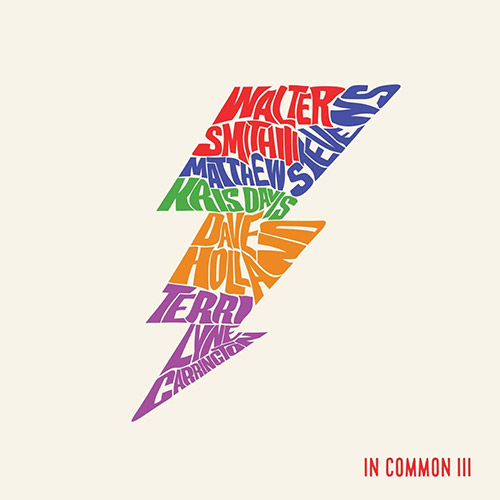

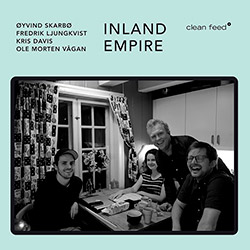
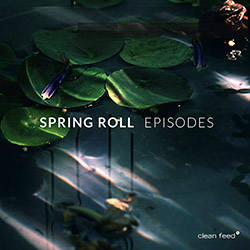

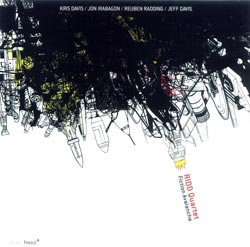
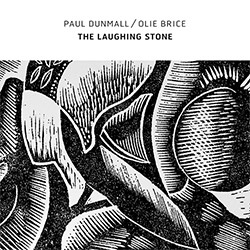
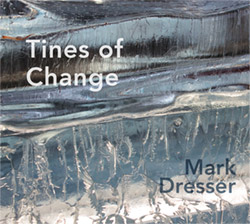

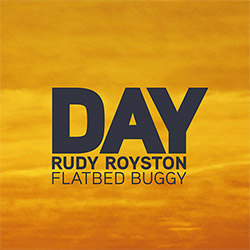
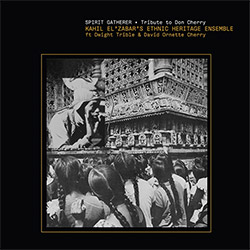
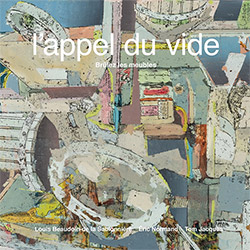
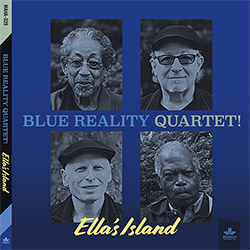
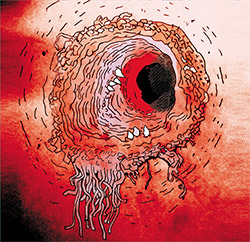
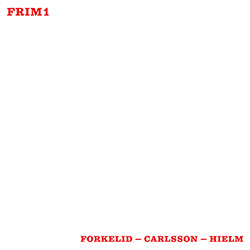


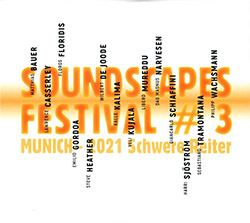

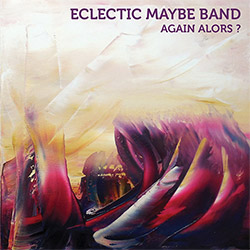
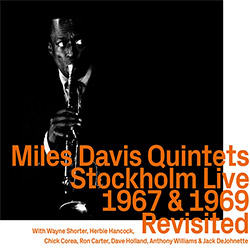




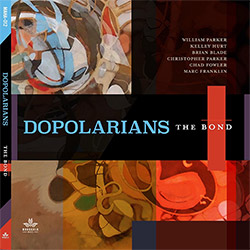





![111 (Michelle / Villamil): Live at Opus 40 [CASSETTE]](https://www.teuthida.com/productImages/misc4/35986.jpg)
![del Pino, Francisco / Charlotte Mundy: The Sea [CASSETTE]](https://www.teuthida.com/productImages/misc4/35987.jpg)

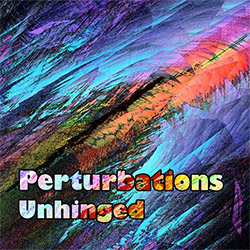

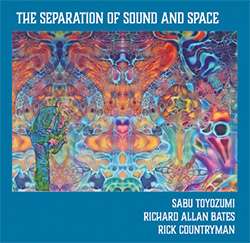
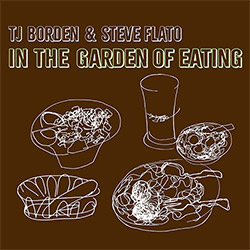

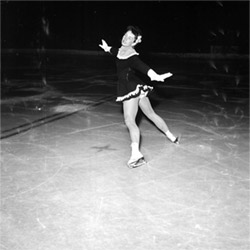
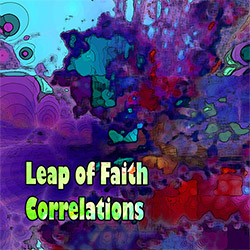

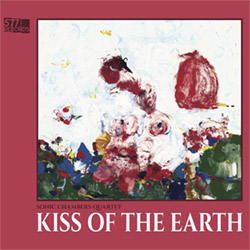

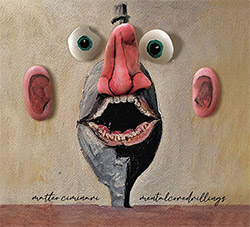
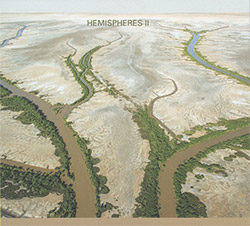
![Niblock, Phill / Anna Clementi / Thomas Stern: Zound Delta 2 [VINYL]](https://www.teuthida.com/productImages/misc4/34623.jpg)
![Yoko, Ono / The Great Learning Orchestra: Selected Recordings From Grapefruit [2 CDs]](https://www.teuthida.com/productImages/misc4/35841.jpg)

![Brotzmann, Peter / John Edwards / Steve Noble / Jason Adasiewicz: The Quartet [2 CDs]](https://www.teuthida.com/productImages/misc4/35975.jpg)
![Brotzmann, Peter / John Edwards / Steve Noble / Jason Adasiewicz: The Quartet [VINYL 2 LPs]](https://www.teuthida.com/productImages/misc4/35976.jpg)
![Thomas, Pat: The Solar Model of Ibn-Al Shatir [VINYL]](https://www.teuthida.com/productImages/misc4/36044.jpg)
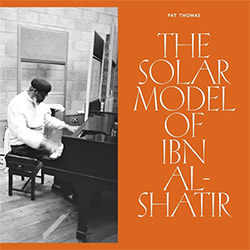



![Rodrigues, Ernesto / Nuno Torres / Guilherme Rodrigues: Whispers In The Moonlight - In Seven Movements [2CDs]](https://www.teuthida.com/productImages/misc4/35765.jpg)



![Cocks, Laura: FATHM [VINYL]](https://www.teuthida.com/productImages/misc4/36055.jpg)













![Schindler, Udo / Sandy Ewen / Damon Smith: Munich Sound Studies Vols. 4, 5 & 6 [3 CDs]](https://www.teuthida.com/productImages/misc4/35966.jpg)
![Turbulence Orchestra & Sub-Units: Smear Out the Difficulties (Double Live) [2 CDs]](https://www.teuthida.com/productImages/misc4/36048.jpg)

![Myers, David Lee : Tin Drop Tear [BOOK w/ DOWNLOAD]](https://www.teuthida.com/productImages/misc4/36030.jpg)

![Ackerley / Prymek / Turner: All Hope With Sleeping Minds [CASSETTE]](https://www.teuthida.com/productImages/misc4/35950.jpg)








![Olencki, Weston : Pearls Ground Down To Powder [VINYL]](https://www.teuthida.com/productImages/misc4/35956.jpg)
![Myers, David Lee: Oculus [2CDs]](https://www.teuthida.com/productImages/misc4/35857.jpg)


![dustsceawung: dustsceawung [CASSETTE w/ Download]](https://www.teuthida.com/productImages/misc4/35753.jpg)




![Halls of the Machine: Atmospheres For Lovers And Sleepers [CASSETTE w/ DOWNLOAD]](https://www.teuthida.com/productImages/misc4/35806.jpg)











![Zorn, John / JACK Quartet: The Complete String Quartets [2 CDs]](https://www.teuthida.com/productImages/misc4/35609.jpg)

![Lonsdale, Eden: Dawnings [2 CDs]](https://www.teuthida.com/productImages/misc4/35480.jpg)







![Sanna, Claudio: Compositori Sardi Contemporanei II [2 CDs]](https://www.teuthida.com/productImages/misc4/35317.jpg)







![Zurria, Manuel: Fame di Vento [3 CDs]](https://www.teuthida.com/productImages/misc4/35167.jpg)

![Electric Bird Noise / Derek Roddy: 8-10-22 [CD EP]](https://www.teuthida.com/productImages/misc4/35970.jpg)








![Elephant9 : Mythical River [VINYL]](https://www.teuthida.com/productImages/misc4/34624.jpg)



![Elephant9 with Terje Rypdal: Catching Fire [VINYL 2 LPs]](https://www.teuthida.com/productImages/misc4/35355.jpg)
![Deerlady (Obomsawin, Mali / Magdalena Abrego): Greatest Hits [VINYL]](https://www.teuthida.com/productImages/misc4/34876.jpg)







![Surplus 1980: Illusion of Consistency [CD]](https://www.teuthida.com/productImages/misc4/35069.jpg)
![Staiano, Moe: Away Towards the Light [VINYL + DOWNLOAD]](https://www.teuthida.com/productImages/misc4/35037.jpg)



![Caveira (Gomes / Sousa / Abras / Ferrandini): Ficar Vivo [VINYL]](https://www.teuthida.com/productImages/misc4/34643.jpg)
![Coley, Byron: Dating Tips for Touring Bands [VINYL]](https://www.teuthida.com/productImages/misc4/17906.jpg)

![Lost Kisses: My Life is Sad & Funny [DVD]](https://www.teuthida.com/productImages/misc4/lostKissesDVD.jpg)